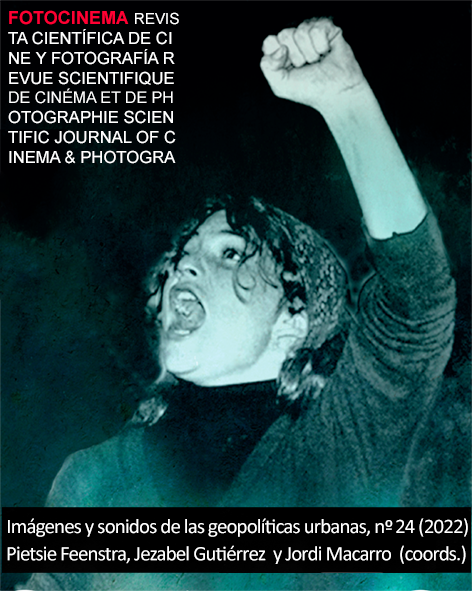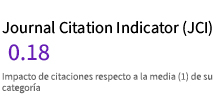Winning the street: images of resistance(s) in Chili. About Hoy y no Mañana (Today & not tomorrow, Josefina Morandé, 2018).
DOI:
https://doi.org/10.24310/Fotocinema.2022.vi24.13732Keywords:
Chilean cinema; documentary film; feminism and urban resistance; Hoy y no mañana; Chile woke up; Arts and resistance in ChileAbstract
Since the early 2000s, a series of documentaires have portrayed a Chili where indignation progressively gained ground, calling into question the discourse of defeat impose by the 1973 coup d’état and 17 years of dictatorship. This process would culminate in the social outbreak of october 2019, symbolically called “despertar” (awakening), whose most striking consequence will be the transformation of an urban space, reappropriated and resignified to change the course of the History. Chili woke up in the street and from the street will be achieved what the politial agreements could not: put an end to the most despotic of the Pinochetist power holdouts, the constitution of 1980. After a brief study of the “poetics” of the occupation of the city of Santiago, this article will focus on the analysis of Hoy y no mañana (Today and not Tomorrow, Josefina Morandé, 2018), one of the documentaries that, studied from the perspective of the revolt (and gender), allows us to delve in that Santiago de Chili, become the ground for the conquest of chilien people, once again, owner of its own destiny.
Downloads
Metrics
Publication Facts
Reviewer profiles N/A
Author statements
Indexed in
-
—
- Academic society
- N/A
- Publisher
- Universidad de Málaga
References
Cancino Palma, J., (2020)«Silenciar en la calle, apropiarse de la estética: la guerra de las imágenes en Chile», Pensamiento Carcaj, flechas de sentido, http://carcaj.cl/silenciar-en-la-calle-apropiarse-de-la-estetica-la-guerra-de-las-imagenes-en-chile/?fbclid=IwAR1NNPEZRnHbgp_a5oe59wQix8_96u8KDdq3dsVhXVtIs1j6XzVXVd-gAoE
Candina Polomer, A. (2019) «La clase media que no era: ira social y pobreza en Chile», in: Mauricio Folchi (Ed), Chile despertó, Lecturas desde la Historia del estallido social de octubre, Unidad de Redes Transdisciplinarias de la Vicerrectoría de Investigación y Desarrollo de la Universidad de Chile, p. 53-58
Cortázar, J. (1978) “Chile: ganar la calle”, en Archieri, G. & Yurkievich, S. (ed.) (2006), Obra Crítica. Obras completas. vol. VI, Barcelona: Galaxia Gutemberg. Círculo de lectores.
Delgado González (2020), Abecedario para Octubre, 27 micro-ensayos desde la revuelta popular, Santiago de Chile: Ventana Abierta Editores.
Espinoza, C. (2021) «Nona Fernández: “Es hora de tejer un relato colectivo sobre nuestro pasado”», El salto.
Espinoza, D. (2019)«Museos y centros culturales: cómo se reactivan los espacios tras el estallido social», La Tercera.
https://www.latercera.com/la-tercera-pm/noticia/museos-centros-culturales-reactivan/911479/?fbclid=IwAR0Clh5blCqNsgAIlExb5XhQIwc1z3_AY89YAvVWWQzAq6PnyFzvoibNmMs
Feenstra, P. y Verzero, L. (ed.) (2021), Ciudades performativas : pra?cticas arti?sticas y poli?ticas de (des)memoria en Buenos Aires, Berli?n y Madrid, Buenos Aires : Instituto de Investigaciones Gino Germani. CLACSO
Flores Leiva, M. (2021) « Arte y mujeres en el Chile reciente: mirar, cuestionar e intentar asir una década » in AAVV, Mujeres en las artes visuales en Chile (2010-2020) Santiago de Chile: Ministerio de las artes, la cultura y el patrimonio, pp. 66-75
Folchi M. (ed) (2019), Chile despertó, Santiago de Chile: Unidad de Redes Transdisciplinarias de la Vicerrectoría de Investigación y Desarrollo de la Universidad de Chile.
Forstenzer, N. (2015), «Les féministes chiliennes de l’Unité Populaire à la post-dictature, 1970-2010», en Obregón, J. y Muñoz, J., Le 11 septembre chilien. Le coup d’état à l’épreuve du temps (1973- 2013), Rennes: PUR- Institut des Amériques, pp. 229-238
Fuguet, A. (2019), «El arte como resistencia», La Tercera
https://www.latercera.com/culto/2019/11/24/el-arte-como-resistencia/
Galende, F. (2007), Filtraciones I. Conversaciones sobre Arte en Chile (de los años 60 a los años 80), Santiago de Chile: Ed. Arcis y Cuarto Propio.
Gaviola, E., Largo, E., Palestro, S. (1994) Una histora necesaria. Mujeres en Chile 1973-1990, Santiago de Chile: ASDI-Suecia
http://www.memoriachilena.gob.cl/archivos2/pdfs/MC0073232.pdf
Hopenhayn, M., «¿Qué tienen contra los sociólogos?, Arte en Chile desde 1973: Escena de Avanzada y sociedad», Documento Flacso, n°46, enero de 1987, Santiago.
Informe anual del sobre la situación de los derechos humanos en Chile, 2019 : https://bibliotecadigital.indh.cl/bitstream/handle/123456789/1701/Informe%20Final-2019.pdf?sequence=1&isAllowed=y
Lobo, O. (2016), «De silencios y miradas perplejas: memoria y subjetividad en el documental chileno contemporáneo. Análisis de La ciudad de los fotógrafos de Sebastián Moreno y Reinalda del Carmen, mi mamá y yo de Lorena Giachino», en Arrué, M., de la Llosa, A. Fernández Domingo, E. & Jammet-Arias, N., Pouvoirs, identités, résistances dans les arts visuels chiliens du XIXe au XXIe siècle, Paris : Université Paris Nanterre, Publications du GRECUN.
Marinai, R. & Meléndez, D., (2020), Muros que hablan : memoria gráfica del despertar social en Santiago de Chile. Octubre 2019-Marzo 2020, Santiago de Chile: Pressenza Virtual Ediciones.
Martínez,J.L., (2019) «Entre estatuas y memorias. Rompiendo una(s) Historia(s) de lo Nacional» en Folchi, M. (ed), Chile despertó, Lecturas desde la Historia del estallido social de octubre, Santiago de Chile: Unidad de Redes Transdisciplinarias de la Vicerrectoría de Investigación y Desarrollo de la Universidad de Chile, p. 28-42.
Moulian, T. (1997), Chile actual. Anatomía de un mito, Santiago de Chile: ARCIS universidad. Lom. Serie punto de fuga
Palestro, S. (1991), Mujeres en movimiento 1973-1990, Santiago de Chile: FLACSO http://www.memoriachilena.gob.cl/archivos2/pdfs/MC0067516.pdf
Quirós, L (ed) (2021), Féminismes et artivisles dans les Amériques (XX-XXI siècles), Presses Universitaires de Rouen et du Havre
Rancière, J. (2018), Les temps modernes. Art, temps, politique, Paris: La fabrique.
Rancière, J. (1998), Aux bords du politique, Paris: La fabrique.
Richard, N. (2007) Fracturas de la memoria. Arte y pensamiento crítico, Santiago de Chile: Siglo XXI editores.
Ricœur, P. (2000), La mémoire, l’Histoire, l’oubli. Paris: Seuil
Sanchez, M. (2020) «Abre en Chile el Museo del Estallido Social», Semana.
https://www.semana.com/arte/articulo/abre-en-chile-el-museo-del-estallido-social/202047
Sosa, P. (2021) «El saber en cuestión. Entrevista a Jacques Rancière», Demarcaciones, n°9.
https://revistademarcaciones.cl/wp-content/uploads/2021/09/4_Entrevistas1_Ranciere.pdf?fbclid=IwAR0Clh5blCqNsgAIlExb5XhQIwc1z3_AY89YAvVWWQzAq6PnyFzvoibNmMs
Valles, P. (2019) «Museo de la Dignidad: una galería callejera en medio de la revolución», La Tercera. https://www.latercera.com/culto/2019/12/10/museo-la-dignidad/
Vergara, C. (2019) «LasTesis le dieron un segundo aire feminista al estallido social» Noticias página web de la U de Chile http://www.filosofia.uchile.cl/noticias/159976/lastesis-le-dieron-un-segundo-aire-feminista-al-estallido-social?fbclid=IwAR20Uh6RrSs9VyJDyWrQYfBuoMPNrnUxMNuKYK_auPY1i_37gJ1wuPq8jCk
Zanbunyan, D. Blouin, P. Boidy, M. Ciret, Y., Gonzalez-Foerster, D., Mitchell, W.J.T, & Roth, S. (2014) Jacques Ranicère. Les grands entretiens d’artpresse, Paris: Art Presse.
Downloads
Published
How to Cite
Issue
Section
License
All contents published in Fotocinema Revista científica de cine y fotografía are protected under the Creative Commons Attribution-NonCommercial-ShareAlike 4.0 International (CC BY-NC-SA 4.0) license. All about this license is available in the following link: <http://creativecommons.org/licenses/by-nc-sa/4.0>
Users can copy, use, redistribute, share and exhibit publicly as long as:
- The original source and authorship of the material are cited (Journal, Publisher and URL of the work).
- It is not used for comercial purposes.
- The existence of the license and its especifications are mentioned.
There are two sets of authors’ rights: moral and property rights. Moral rights are perpetual prerogatives, unrenounceable, not-transferable, unalienable, imprescriptible and inembargable. According to authors’ rights legislation, Fotocinema. Revista científica de cine y fotografía recognizes and respects authors moral rights, as well as the ownership of property rights, which will be transferred to University of Malaga in open access. The property rights are referred to the benefits that are gained by the use or the dissemination of works. Fotocinema. Revista científica de cine y fotografía is published in an open access form and it is exclusively licenced by any means for doing or authorising distribution, dissemination, reproduction, , adaptation, translation or arrangement of works.
Authors are responsable for obtaining the necessary permission to use copyrighted images.














13.png)



